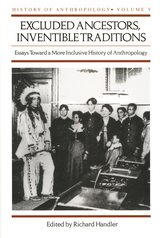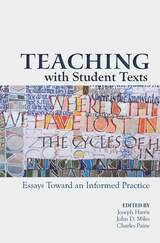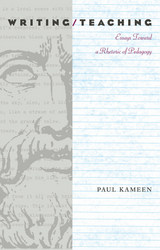
The essays in Excluded Ancestors illustrate varied processes of inclusion and exclusion in the history of anthropology, examining the careers of John William Jackson, the members of the Hampton Folk-Lore Society, Charlotte Gower Chapman, Lucie Varga, Marius Barbeau, and Sol Tax. A final essay analyzes notions of the canon and considers the place of a classic ethnographic area, highland New Guinea, in anthropological canon-formation. Contributors include Peter Pels, Lee Baker, Frances Slaney, Maria Lepowsky, George Stocking, Ronald Stade, and Douglas Dalton.


Harris, Miles and Paine ask: What happens when the texts that students write become the focus of a writing course? In response, a distinguished group of scholar/teachers suggests that teaching with students texts is not simply a classroom technique, but a way of working with writing that defines composition as a field.
In Teaching with Student Texts, authors discuss ways of revaluing student writing as intellectual work, of circulating student texts in the classroom and beyond, and of changing our classroom practices by bringing student writings to the table. Together, these essays articulate a variety of ways that student texts can take a central place in classroom work and can, in the process, redefine the ways our field talks about writing.

2001 CCCC Outstanding Book Award
The vast majority of academic books are written from the scholar’s position, even those that primarily concern teaching. Writing/Teaching, on the other hand, is a book about teaching written from the position of the teacher. As the title suggests, Kameen’s book is split into two halves—yet both, in different ways and through different discourses, are derived from his work in the classroom, and his own struggle with issues and problems all teachers of writing must face.
The first half is a series of essays originating from a graduate seminar Kameen team-taught with professor and poet Toi Derricotte in 1994. Included are essays Kameen wrote, a selection of pieces written by other members of the group, and a reflective “postscript.” These essays combine personal narrative, reflective meditation, and critical inquiry—all used as discourse to depict and examine the process of teaching.
The second half of the book contains essays on Plato’s dialogues—primarily Phaedrus and Protagoras—as a means to interrogate the position of teacher through the lens of the most famous of Western pedagogues—Socrates. Here, Socrates is used as a tool to examine and critique both Kameen’s own teacherly identity and, in a wider sense, the set of cultural forces that pre-figure the available positions for both “teacher” and “student” in contemporary education.
What unites both halves is the way Kameen approaches each—the “personal” and the “scholarly”—from his position as teacher. The texts presented provide the occasion for a complex and nuanced meditation on the classroom as a legitimate arena for the production of knowledge and research. Sure to be timely and controversial, Writing/Teaching will enter into the debate on whether to reconfigure the relationship between research and teaching currently taking place among teachers of composition, cultural studies, and rhetoric. Compelling reading for teachers or those contemplating a career in the profession.
READERS
Browse our collection.
PUBLISHERS
See BiblioVault's publisher services.
STUDENT SERVICES
Files for college accessibility offices.
UChicago Accessibility Resources
home | accessibility | search | about | contact us
BiblioVault ® 2001 - 2024
The University of Chicago Press









